Alexis Lantgen's Blog, page 6
February 22, 2021
Review: A Declaration of the Rights of Magicians by H.G. Parry
It must have been fate, or perhaps intuition. Only a couple of days before the winter storm that would pretty much disable most of Texas and keep me from 1. leaving home and 2. using the internet very much, I happened to see a copy of H.G. Parry’s A Declaration of the Rights of Magicians in Barnes and Noble. I already had a couple of other books I was reading. I had a full nightstand of books I was intending to read. And I rarely buy thick, heavy books at full price from B&N (and this book is very thick and heavy). But this time, for whatever reason, I took a chance. I thought it had an intriguing premise, and I liked the cover. I also love history and fantasy, and this book seemed to be full of both of those things.
I’m glad I did. While we were lucky enough not to lose power during the winter storm (we live close to a hospital, so I think they spared our section of the grid from the rolling blackouts), we didn’t really have much internet connection, and I tried to keep TV watching to a minimum to keep from using too much electricity. So I ended up spending a lot of time reading. I finished the two books I’d been working my way through (reviews of those to come), and started on this hefty books I bought on a whim. It sucked me in from the very first pages.
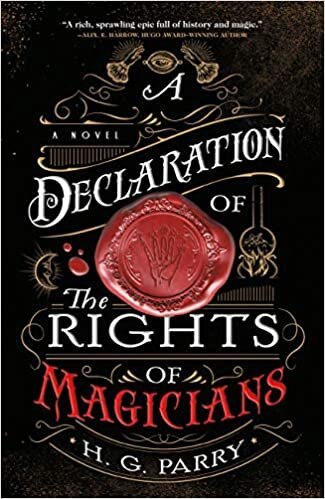
Cover of A Declaration of the Rights of Magicians
I will warn you, the book contains some very graphic and intense descriptions of violent and horrifying historical events, from the infamous Middle Passage that brought slaves to the West Indies to the horrifying violence of the Reign of Terror in France. Some of the reading is gut-churning, but the story, and the amazing characters, make it all worthwhile in the end. Speaking of characters, H.G. Parry manages to capture and humanize some of history’s most notorious figures, in particular Robespierre. As someone fascinated by the French Revolution, I’d always imagined him as a sociopath who took advantage of the Revolution to indulge a taste for violence. Yet, Parry’s depiction, of an ultimately tragic character who desperately wanted to bring freedom and equality to France, feels heartbreakingly true.
I also loved her depiction of Fina, a slave girl who ultimately escapes and joins the resistance. I liked that Fina was so human and honest. She was vulnerable and sometimes she does despair (which I think is a very reasonable response to her situation). But when she finally escapes, she fights to regain the life that was stolen from her.
I wouldn’t have expected William Pitt the Younger to be quite so interesting a character as Parry depicts him, but in her hands, even English parliamentary debates feel exciting and engaging (and of course, magical).
Speaking of magic, Parry has created an interesting magical system. In her world, magic is an “inheritance” which is freely practiced by the Aristocracy, but suppressed, often violently, in the common people. Dark magic, including blood magic and necromancy, is forbidden. Slaves are controlled by a combination of alchemy and mesmerism (or mind-control magic). The magic in her world feels natural, like an extension of someone’s personality.
Overall, I’d recommend this book to anyone who likes fantasy or history. It’s an epic, incredible story with amazing characters and interesting magic. It’s just a great book to read, even if you’re not snowed in!
science fiction fantasy author interview book review books Saints and CursesFebruary 14, 2021
Interview with Science Fiction Writer P.J. Sky
My next author interview is with P.J. Sky, the author of A Girl Called Ari and Ari Goes to War!
Tell us about yourself! What would you like readers to know about you?P.J. Sky: I’m P. J. Sky, author of A Girl Called Ari and Ari Goes To War. I’m currently working on Ari’s third adventure.
I’m from the UK, and I’ve written from a young age. I’ve always been a fan of science fiction, but I’m also completely in love with the written word. I feel like a novel is a specific thing - it’s not just a story, it’s the exploration of an idea.
What book or books have most influenced you as a writer?P.J. Sky: I’m hugely influenced by the classics - Crime & Punishment, The Catcher in the Rye, Jane Eyre, Breakfast At Tiffanies, and science fiction works like Brave New World and Dune. I love the dystopian fiction of J. G. Ballard, particularly his apocalypse works. And I’m a big fan of The Hunger Games. But it was reading Blood Red Road by Moira Young that really got me writing post-apocalypse fiction.
Alexis: Awesome! I actually love reading classics as well. I think it’s always a benefit to a writer to read great literature. I’ve never read Blood Red Road, but it sounds interesting.
What are some tropes of fiction in your genre that you love/hate? Why?P.J. Sky: That’s a hard one to answer, because I think most of the main tropes, like government control, environmental disaster, survival, revolution, these all remain just as relevant today as they did fifty years ago and there are almost infinite ways they can still be explored. I think though, if you’re an author who wants to explore these themes, then you should have a reason to explore them and not just use them as a backdrop.
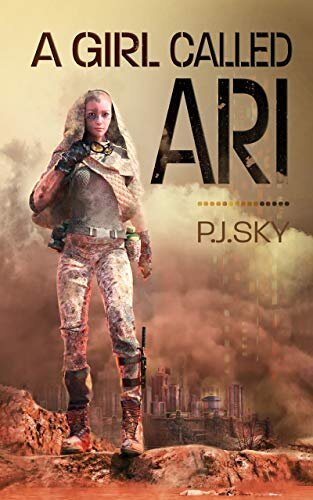
Cover of A Girl Called Ari by P.J. Sky
Who is your favorite character in your book? What do you like about them? (or, which character do you hate most and why)P.J. Sky: With A Girl Called Ari, it’s Ari. As I was developing the book I had the setup, the theme, and I’d stranded my main character out in the wasteland and I thought, “Who’s she going to meet?” and it was like Ari just walked out of the wasteland and into my head and she just took over the narrative. She was hard to work with and wouldn’t do anything she didn’t want to do, but I couldn’t have written the book without her. In the end, I had to name the book after her.
With Ari Goes To War, I’ve a real soft spot for Keshia. She’s a new character to the series and I hope readers like her. Again, this time it was sort of the other way around. As war waged across the wasteland, I had Ari taking refuge in the town of Bo - a sort of wasteland Casablanca, and I thought, “Who’s she going to meet?” and it was Keshia.
What are you doing to de-stress during the pandemic? Is there any coping mechanism you’d recommend (or NOT recommend)?P.J. Sky: I feel like I’ve coped pretty well during the pandemic. Basically, I’ve written, and writing has been a wonderful way to escape into my head. I’ve also taken up yoga and long walks.
What do you like to do other than read or write? Do you have any interesting hobbies?P.J. Sky: I play piano slightly better than I play guitar, which I play slightly better than I play bass, and a lot better than I play the drums, but I do have a drum kit I can hop onto whenever I need to make a lot of noise. I’m sure the neighbors understand - I’m usually very quiet.
Alexis: I’m a musician, too. I mostly play violin and viola, but I’ve also recently learned ukulele and a little guitar. I do think that music’s a great way to relax and it’s so fun.
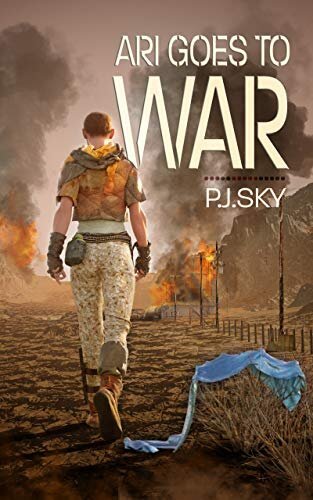
Cover of Ari Goes to War by P.J. Sky!
What TV shows/Movies do you like to watch or stream?P.J. Sky: I think I’m a lifetime Buffy fan. But recently I’ve been enjoying Stranger Things, The Boys, The Chilling Tales of Sabrina, and the new season of Star Trek Discovery. I also loved The Mandalorian.
Alexis: Haha, I love all those shows too! Right now, I’ve been enjoying WandaVision as well.
What advice do you have for other writers or people just getting started in writing?P.J. Sky: Do it because you love writing and let the writing be its own reward. Never stop learning. And learn to love editing, don’t assume you can leave it to someone else. But also, don’t assume you can do it all yourself. And remember, a first draft is only ever the stepping stone to the second.
How do you choose what books you want to read?P.J. Sky: I tend to read a wide variety of genres. I think it’s important for a writer to read beyond their genre - a good book is a good book whatever the genre. My bookcase is literally all over the place.
What technology or innovations or scientific discoveries have inspired your work?
P.J. Sky: When I developed A Girl Called Ari I had this idea - that science fiction stories are full of technology and innovations, but what if I treated the human experience in the same way? So in my novels there are no technological innovations, or at least not many, but instead there’s a real focus on the human experience. Maybe this means the book isn’t really science fiction? But I feel like I’ve approached it in a science fiction way.
More About P.J. Sky:Books: A Girl Called Ari and Ari Goes to War
Social Media: Goodreads and Twitter
February 10, 2021
Interview with Speculative Fiction Writer Brad Kelly
My next interview is with speculative fiction writer Brad Kelly, the author of House of Sleep!
Tell us about yourself! What would you like readers to know about you?Brad Kelly: I am a writer of primarily speculative fiction. I have written two novels and am midway through my third, as well as a host of short stories. I am a former Michener Fellow but tend to write outside of the MFA style and paradigm. I’m not sure they knew what to do with me while I was there. If you’re into speculative weirdness with a more literary aesthetic, my work might be for you.
What book or books have most influenced you as a writer?Brad Kelly: Blood Meridian and other works by Cormac McCarthy, a Canticle for Lebowitz and Riddley Walker. Tree of Smoke by Denis Johnson, William S. Burroughs’ “Cities of the Red Night” trilogy, Stephen King was huge for me as a kid—the Stand, It, Dark Tower, etc. Kafka, for sure. Borges was a genius on multiple levels and any speculative writer would benefit from perusing his short work. The figure of Philip K. Dick is ever-present in my mind, and the books in his VALIS phase serve as some kind of proof to me about how far-out a writer can go and still resonate with people. He has a a tremendous body of work that any writer should delve into. I read Dune every few years and while its influence on my writing is limited, it has been enormously important to how I think about life.
What are some tropes of fiction in your genre that you love/hate? Why?
Brad Kelly: I’ve struggled to understand exactly what genre I’m writing in. I have an immense love for science fiction, and yet what has always prevented me from going full-steam in that direction (and working in, say, space opera) is that even the best sci-fi tends to believe that reality, at its core, is rational or can be rationally explained. I’ve had experiences that suggest to me that there is something far more mysterious at the heart of things. So, I write speculatively and edge into what might be called “weird fiction” like, say, Jeff Vandermeer. I don’t want things explained. There’s more depth and intrigue to me when “important” phenomena aren’t totally legible—I mean, I struggle to understand daily life half the time, so why should my characters be able to explain, for instance, a chthonic time demon or a hole through the fabric of reality.
I am solidifying in a sort of sub-genre that I’m calling “psy-fi”--psy for psyche, psychological, maybe psychedelic. The way that science fiction tends to play these wonderful “what if” games with scientific or technological concepts, I like to play that with matters related to how the mind works: time, dreams, language. What I love about writing in this sort of niche is the combination of freedom and limitation—no idea is off the table, exactly, but you still have to keep to the rules of the world you’re creating. I think limitation is where real creativity emerges.
Alexis: Interesting! I love writing that sort of challenges the way we perceive reality. There’s something very philosophical about it.
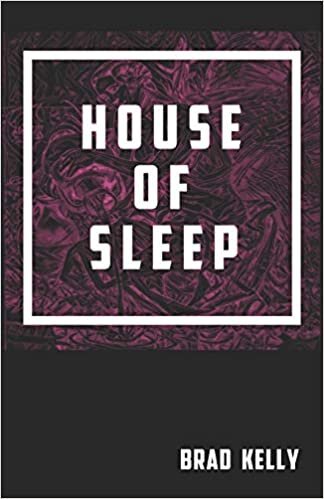
The cover of House of Sleep by Brad Kelly
Who is your favorite character in your book? What do you like about them? (or, which character do you hate most and why)Brad Kelly: My favorite character to write—though not my favorite person—is a guy who goes by the Diving Man. He’s the founder of the House of Sleep, an enigmatic guru figure with an adventurous and implausible past. Parts Willy Wonka and Timothy Leary and even a little bit of Judge Holden from “Blood Meridian,” he is obsessed with saving the soul of humanity and his means for getting there are. . . let’s say questionable. He came to me first in a dream and his style of speech and worldview seemed to pop out fully formed—which is very unusual for me and my process. I think he’s incredibly dangerous, and I think he’s also fascinating. I hope that readers enjoy reading him as much as I enjoyed getting him on the page.
What are you doing to de-stress during the pandemic? Is there any coping mechanism you’d recommend (or NOT recommend)?
Brad Kelly: My day job is considered essential, so a lot of my life is the same as before the pandemic. I’m trying to keep up the workout routine which is critical for sanity. So. . . if I’d recommend anything, I guess it’s squats. I wouldn’t recommend drinking too much. Though, I guess I also wouldn’t recommend not drinking at all.
Alexis: Yes, I do find exercise very helpful. I’m a huge fan of long walks and bike rides, myself.
What do you like to do other than read or write? Do you have any interesting hobbies?Brad Kelly: I am a student of the tarot to a degree. I read cards for others (not so much since Covid) and explore the symbology for myself. I read every Tarot book I can get my hands on. As a writer, I find it an indispensable system. Each card, and the way they’re networked together, is a rich reservoir of symbols. The act of reading them for another person is a kind of writing, in that you’re trying to thread all these images together into a cohesive narrative that “works” for the person. I don’t invest too much mysticism into it. . .I basically think they operate like any other kind of art. But, tarot is amazing. I think every writer should spend some time trying to understand the cards.
Alexis: I think tarot is fascinating for the archetypes and psychology behind it, as well as the strangely compelling stories the cards tell. Each one is like a little bit of micro-fiction. If you like tarot, you should watch HBO’s Carnivale, a show that really uses tarot in a fascinating way, both in its opening and as a means of story telling.
What TV shows/Movies do you like to watch or stream?Brad Kelly: I was somewhat obsessed with the first few seasons of Fargo. I go through Twilight Zone phases where I will watch a streak of episodes. Movies are difficult to find time for lately, but I’m a huge fan of Denis Villeneuve. . . I think he’s the best thing that’s happened to sci-fi cinema since the original Blade Runner and I’m giddy about seeing his version of Dune when it comes out.
What’s your favorite animal?Brad Kelly: Owls. Easy. I write with about twelve tchotke owls sitting watch over me. They are symbols of wisdom, of seeing in the dark, of silence. I find a lot of solace in them and seeing them in nature is a rare treat. Such unusual and beautiful creatures.
Alexis: I love owls! I actually have an owl box in my front yard, though no owls live in it yet. I got it one of the people in my neighborhood had one, and in the evenings I’d walk by and see their little owl (a Western screech) peeking its head out of the hole.
I also have a strange owl story. Once on a late night drive down in South Texas, my husband and I saw one of the largest owls I’ve ever seen, just standing in the middle of the road. That area is known for its Great Horned Owls, but this owl looked larger than any Great Horned Owl on record. There are lots of stories of Lechuza in that area, and I wonder if the eerily giants owls are the inspiration.
Do you have pet(s)? If so, share a picture of your pet!Brad Kelly: This is Lucy. She is ridiculous.

Brad Kelly and his dog, Lucy
What advice do you have for other writers or people just getting started in writing?Brad Kelly: There’s an old adage about finding your voice, which I think is important and yet mysterious. Beyond that, I would only say a couple of things. One is that you have to focus on the craft at every level: sentence, paragraph, scene, chapter, book. The other is work hard but do not rush. Revise, revise. I come across a lot of writing that has something wonderful at its core but is clearly a second draft—we live in an impatient era and writing is a patient—extremely patient—game.
How do you choose what books you want to read?Brad Kelly: I wonder this myself. It feels like there is a through-line to what I’m picking, but I can’t seem to figure out what it is. Some of it is research (reading a lot about tunnels and underground spaces right now) but most of it is following my whimsy. I suppose what attracts me is works that seem to have an avid fanbase but that are not otherwise well-known or celebrated. Titles and covers, too. We’re not supposed to judge by them, but how can you not. For instance. . . I bought a book by Anna Kavan called “Machines in the Head” last year. I didn’t know anything about it, I just thought the title was compelling and totally original. And it turns out the book is both of those things. If a book has interested me, I usually try to read a page from somewhere deep in and see if it resonates. This strategy has never failed me.
More About Brad KellyWebsite: https://www.bradkellyesque.com/
Book: House of Sleep
Social Media: Twitter
author interview book review books fantasy science fiction short stories SapienceJanuary 30, 2021
Review: Ruby Slippers, Golden Tears
I do love fairytale re-tellings, and after reading Black Thorn, White Rose (as well as Black Swan, White Raven and The Green Man: Tales from the Mythic Forest), I decided to read another collection by Ellen Datlow and Terri Windling: Ruby Slippers, Golden Tears.
Like many anthologies, this one has many stories that I loved, a couple that were good, and a few that didn’t work for me for various reasons. I loved Tanith Lee’s The Beast, which was a haunting, disturbing story about the selfish cruelty a beautiful face can sometimes hide. I think this story had even more power because it felt as though it somehow surfaced subtle elements of classicism and perhaps racism that can underlie some types of stories. Likewise, Masterpiece by Garry Kilworth established an eerie, disturbing, twist on Rumpelstiltskin, one that examines how much we understand and except the bargains we make, and what we’re willing to sacrifice for the things that we want.
Another story I loved was Ellen Steiber’s The Fox Wife, a Japanese-inspired tale that contrasts the confining, controlling horrors of domestic violence with the freedom and wildness of foxes. It’s setting is beautiful and opulent as well as dangerous. Jane Yollen’s The Traveler and the Tale is another great story, one that examines the importance of stories and tales in a culture. I loved the references to the strange, dark fairytales that don’t get retold as often as the happy stories, but somehow stick in your memory so vividly.
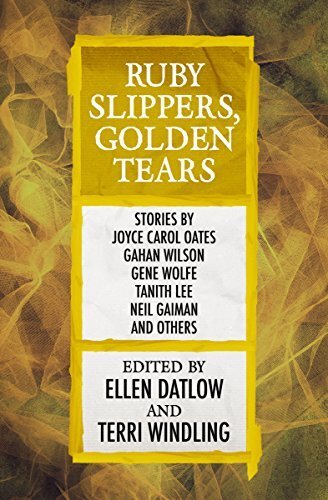
Cover of Ruby Slippers, Golden Tears
Several of the stories in Ruby Slippers, Golden Tears are powerful, but also very disturbing and hard to recommend unless you have a strong stomach and are not easily triggered. In particular, Anne Bishop’s Match Girl is extremely hard to read, with some very intense depictions of violence against women and rape. I won’t deny it’s a powerful story, but it’s so grim and cruel, it’s not necessarily a story I’d want to read again. Likewise, The Real Princess by Susan Palwick is a very disturbing, extremely violent story. with a weirdly unsatisfying ending (though I think it was supposed to be a happy one, it certainly didn’t feel that way).
Most of the other stories in the book are interesting, but didn’t quite capture me in the way that some of the others did. They’re good entertainment, but didn’t particularly speak to me on a deeper level. I will say that the book didn’t have any stories I disliked or thought were badly told.
Overall, I’d recommend Ruby Slippers, Golden Tears to anyone who enjoys fairy tales and fantasy stories, with the caveat that a couple of the stories might be too violent for some readers.
author interview book review books fantasy science fiction short stories Saints and CursesJanuary 27, 2021
Book Spotlight: The Book of Uriel by Elyse Hoffman
Congratulations to author Elyse Hoffman on the release of her absolutely stunning novel, The Book of Uriel ! Check out the description, and don’t forget to enter the giveaway for a $25 Amazon giftcard!
In the fires of World War II, a child must save his people from darkness…
Ten-year-old Uriel has always been an outcast. Born mute in a Jewish village known for its choir, he escapes into old stories of his people, stories of angels and monsters. But when the fires of the Holocaust consume his village, he learns that the stories he writes in his golden notebook are terrifyingly real.
In the aftermath of the attack, Uriel is taken in by Uwe, a kind-hearted linguist forced to work for the commander of the local Nazi Police, the affably brutal Major Brandt. Uwe wants to keep Uriel safe, but Uriel can’t stay hidden. The angels of his tales have come to him with a dire message: Michael, guardian angel of the Jewish people, is missing. Without their angel, the Jewish people are doomed, and Michael’s angelic brethren cannot search for him in the lands corrupted by Nazi evil.
With the lives of millions at stake, Uriel must find Michael and free him from the clutches of the Angel of Death...even if that means putting Uwe in mortal danger.
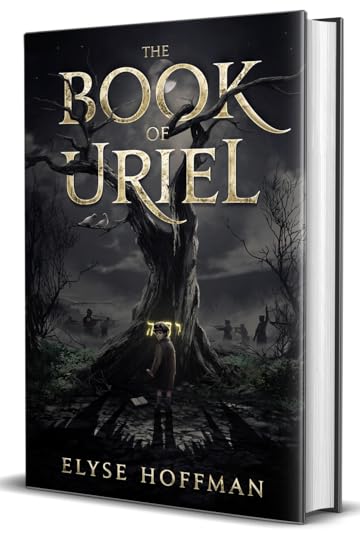
Cover of The Book of Uriel by Elyse Hoffman
About the AuthorElyse Hoffman can write a lot of things, but finds her own story dull and difficult. She has been interested in the Holocaust and Nazi Germany since she was thirteen. Her somewhat morbid fascination is purely intellectual and emotional. She advises you to be careful when signing contracts. You never know where or when you may end up.
 More About Elyse Hoffman
More About Elyse HoffmanBooks: Barrack 5, Barrack 4, Barrack 3, Barrack 2, and Barrack 1
Project 613: https://project613publishing.com/
Social Media: Facebook, Twitter, and Bookbub
Don’t forget to check out the giveaway!
author interview book review books fantasy science fiction short stories Saints and Curses
January 18, 2021
Book Review: Piranesi by Susanna Clarke
Wow. Sometimes you just read a book, and it’s just an incredible journey. That’s what this book is—a haunting, beautiful, magical journey though a world that’s vivid and still so surreal. Yet, the language and writing is beautifully clear. There’s no hard-to-follow stream of consciousness writing, just evocative imagery and an incredible mystery. What’s more, unlike some books that taunt you with a deep mystery and then never answer any questions or solve anything, Piranesi comes to an incredible, heartfelt, and well-earned ending.
Much of the charm of Piranesi is probably due to its protagonist, a man who is called Piranesi, though he’s certain that’s not his name. He has a kindness, warmth, and decency to him, as well as wonder and love for the incredible world around him, that makes him incredibly likable and fun to read. The world he inhabits is a magical house with seemingly infinite halls and a sea in the lower rooms, yet Clarke draws it so realistically that you can picture every statue and doorway.
I wish I could explain more without giving away parts of the mystery, but honestly, if there’s one book you read this year, it should be this one. I can’t recommend it enough for anyone who like fantasy, or honestly any thoughtful and compelling books at all. I’m literally tempted to re-read it now that I know what happens, just to catch all the fantastical details and haunting secrets.
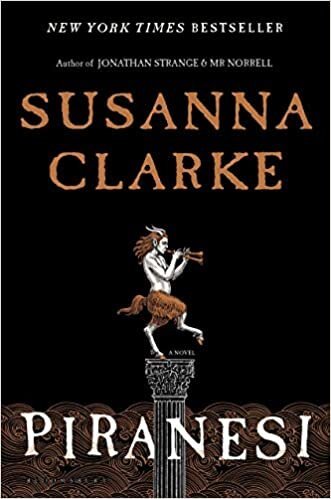
The cover of Piranesi by Susanna Clarke
author interview book review books fantasy science fiction saints and cursesJanuary 14, 2021
Cover Reveal: The Place Beyond Her Dreams by Oby Aligwekwe
I am so excited to share this beautiful cover for Oby Aligwekwe's debut YA Fantasy, The Place Beyond her Dreams. The book is available for preorder on Amazon now, with an expected publication date of March 16, 2021!
At the sudden death of her grandfather, Ona’s pain drives her to mystical Luenah—a place of infinite possibilities. There, she discovers she is an Eri, chosen to accomplish a special purpose on earth, and is handed a box in exchange for what she desires the most.
Burdened by her quest, Ona learns that dreams carry a hefty price, and no one is who they seem. As evil looms, she must unmask the villain and save the one she loves, even at the risk of losing everything she holds dear.
Set against the backdrop of two warring towns, The Place Beyond Her Dreams delivers life lessons using a powerful fable. This coming-of-age fantasy takes the reader on the path to self-discovery and demonstrates the transformation one must go through to realize and eventually occupy their purpose.

Cover of Oby Aligwekwe's debut YA Fantasy, The Place Beyond her Dreams
About the AuthorOby Aligwekwe is the author of Nfudu and Hazel House. The Place Beyond Her Dreams is her Young Adult debut. A talented writer, Oby is also an inspirational speaker and a chartered accountant. She lives in Oakville, Ontario, with her family and supports her community through her charity Éclat Beginnings.

Oby Aligwekwe, author of The Place Beyond Her Dreams
More About Oby AligwekweBooks: The Place Beyond Her Dreams, Hazel House, and Nfudu
Social Media: Twitter, Facebook, Instagram, and Goodreads
Website: www.obyaligwekwe.com
 author interview book review books fantasy science fiction short stories Saints and Curses
author interview book review books fantasy science fiction short stories Saints and Curses
January 9, 2021
Interview with Science Fiction and Fantasy Writer Mark Rice
My next author interview is with Mark Rice, author of The Cabin Incident and Heathen Howff, a collection of Scottish stories inspired by Aesop’s Fables, but for adults.
Mark Rice: The big one was The Hitch-Hiker’s Guide to the Galaxy by Douglas Adams. I first read it when I was ten. It was the book that made me think, ‘I want to do that.’ The book that made me want to infuse my writing with humour was another I read as a kid – Wee MacGreegor by JJ Bell, one of the funniest books ever written, and very Scottish. The dialogue in that is pure gold. As a teen I mostly read sprawling fantasy novels by the likes of Robert E. Vardeman, Victor Milan, JRR Tolkien, Piers Anthony, Raymond E. Feist…that sort of epic stuff. The books that have most influenced me as a grown-up are The Satanic Verses by Salman Rushdie, The Testament of Gideon Mack by James Robertson, The Book Thief by Markus Zusak, the entire literary output of Kurt Vonnegut, and – just recently – Hamnet by Maggie O’Farrell.
Alexis: Wow, it’s cool that you read so widely, from humor to epic fantasy to some very intense and thoughtful modern works. I remember finding The Satanic Verses such an incredible and powerful book, and I still love The Hitch-Hiker’s Guide to the Galaxy.
Who is your favorite character in your book? What do you like about them?
Mark Rice: My favourite characters are usually the non-human ones (the same is true in life). In Metallic Dreams my favourite characters are a rabbit named Fluff and a little girl called Sunshower, partly because those characters have innocence that the others, to some degree or other, have lost (or never had in the first place). Sunshower was a gift from the literary gods. Most characters in fiction are either based on real people or they’re cobbled together Frankenstein’s monsters featuring a trait here and an idiosyncrasy there. Sunshower wasn’t like that. She fell out of the sky, fully formed, and landed in my mind ready to live her story. I could see her more vividly than I see people in real life. As I said, a gift from the literary gods. The same thing happened with the character Tam the Bammus in my short(ish) story Revelation Was Wrong. Tam stomped into my mind, fully formed, grumpy and ready to tell his tale. I didn’t even have to put effort into that story – it told itself. I just acted as a conduit. Other characters I really enjoyed writing (and still enjoy writing in the sequel) are DT, Pete, Paul, Oz, Iain, Archibald, Brian, Ted and Manie in Metallic Dreams. They’re based on friends I’ve known and loved since childhood, which makes them extremely easy to write: I know exactly how each one would act in any given situation. And the Devil was/is fun to write. Worryingly easy too.
What do you like to do other than read or write? Do you have any interesting hobbies?Mark Rice: I’m obsessed with 3D digital modelling. I first got into it nine years ago when I created the cover for my story Revelation Was Wrong. This year I created the cover for my bear-heavy story The Cabin Incident using the same 3D modelling software. In addition to those book covers, I’ve done hundreds of high-resolution 3D renders, some as possible future book covers, but most of them just for fun and creative satisfaction. It’s a whole other Universe which I find immersive and fascinating, and I learn more about it every day. Most book covers are formulaic. I approach cover art in a different way. I grew up buying vinyl records and marveling at their cover artwork. This has led me to view book-cover design in that way – why use a generic cover when you can create original art that stops people in their tracks? In that sense, my book covers are more like album covers.
Music’s a big pastime – listening to it and making it (if cranking out loud riffage on electric guitars counts as making music). I grew up in a house that had no television, but it had an abundance of music, musical instruments, books and animals. That sums up how I became what I am.
Exercise is important to me. I swam competitively from ages 7-22, so the habit of hard daily exercise was set then. When I donned my wetsuit recently and plunged into the sea, my wolfdog sidekick pulled me out by my flipper…twice. On the second instance he ripped off my right flipper with his teeth, ran half a mile up the beach with it and buried it in the sand. He obviously figured I was an idiot who didn’t realize that the sea is dangerous. After hinting at it once (and me not getting the message), he felt that more drastic action was necessary to prevent said idiot from making a third venture into the ocean. I ride my mountain bike through a nearby forest each day while the wolfchild runs at my side. I enjoy lifting heavy things. I’ve been weight training since back in my competitive swimming days. I lift heavier these days…because there’s more of me.
Alexis: I love that your wolf dog tried to “rescue” you while you were swimming! I had a golden retriever who use to do the same thing when my sister and I went swimming. She’d grab our hair in her mouth and try to pull us back to shore! Otherwise she loved the water, though she clearly didn’t trust us in it.
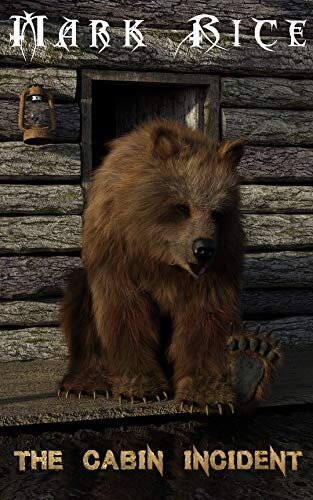
Cover of The Cabin Incident by Mark Rice
Tell us about a mystery/urban legend from your hometown (or another place you’ve lived).
Mark Rice: I live on the mainland of Scotland but have spent a lot of time on the Scottish islands of Skye and Lewis in the Outer Hebrides (my dad was from Lewis, as was his mother, and so on back ad infinitum). One of my cousins in Lewis showed me a piece of footage filmed on Skye. In it, an English interviewer spoke to a local crofter about a supposed ghost sighting.
The interviewer said, “I understand you saw the ghost of a woman walking down the road. Can you tell me about it?”
The crofter replied, “Yes. I saw the ghost of a woman walking down the road.”
That was it. Not another word. The interviewer waited and waited, expecting more, but none came. My cousin and I were in tears laughing. I think that’s the best ghost story ever told. That crofter understood the beauty of brevity.
What TV shows/Movies do you like to watch or stream?
Mark Rice: Justified, Deadwood, Breaking Bad, Better Call Saul, South Park, Game of Thrones, Shetland, Twin (Norwegian drama), Borgen (Scandi drama), The Bridge (original Scandinavian series), just about any other Finnish or Scandinavian drama noir – I love their dark ambience, and the production values/writing quality are phenomenal. I also can’t get enough of Captain Caveman or Scooby-Doo (that’s not a recent development, I should stress). The greatest TV show ever made, I reckon (I believe that George RR Martin nicked loads of his story ideas from it) is Chorlton and the Wheelies, ostensibly a children’s show about a kingdom under a black spell due to a Welsh witch (who lives in a kettle), until a dragon called Chorlton (a happiness dragon) blunders into the realm one day and breaks the spell, after which he inadvertently foils all the witch’s evil schemes just by being his happy, authentic self. What a powerful message that is. Even though it was intended as a children’s show, there’s a lot of adult subtext. For example, the queen’s always grumpy because she doesn’t get enough attention from the king, who is perpetually distracted by his love for Chorlton. So there’s a sexually frustrated queen and a gay would-be bestiality practitioner king who’s in love with a dragon. In addition, one of the Wheelie people – a male called Zoomer – clearly has drug issues: he can’t concentrate on anything for more than a couple of seconds as he zooms around day and night, which leads me to conclude that he’s on speed and/or cocaine. It’s all there in Wheelieworld. And I’ll watch anything with Fran Drescher in it. In a parallel Universe she and I met and married in the ‘90s.
What’s your favorite animal?Mark Rice: I love all animals, from the biggest ones right down to the tiniest insects. That’s why I don’t eat them, wear them or buy any products that cause them suffering. To pick a favourite species is an impossible task. The four particular animals I’ve most resonated with are a white rabbit who lived with me for her whole life, starting when she was a baby small enough to fit on my palm (the rabbit in Metallic Dreams was based on her), the aforementioned wolfdog who is my training partner/sidekick, a female camel I met in the desert while living with Bedouins (she and I fell in love at first sight), and an octopus I made friends with while scuba diving off the coast of Cyprus (he rested his head on my left hand and wrapped his tentacles around my left arm while I stroked his head with my free hand and we looked into each other’s eyes, really saw each other; when the oxygen in my tank ran out and I had to reluctantly surface, the octopus didn’t willingly let me go – I had to (again reluctantly) prise his suckers off my arm; they left circular marks that remained there for hours; I hoped they’d never fade, as they were reminders of a transcendent experience; the sentience I saw in that creature was unique and unlike anything I’ve experienced on dry land). I have an affinity for horses, bears and elephants too. And pigs. Mustn’t forget the pigs. And sheep. And goats. I could go on all day…
Alexis: That’s an amazing story about the octopus—they’re fascinating creatures, and supposed to be incredibly intelligent.
Do you like playing video games? What’s your favorite game right now? Has a video game ever influenced you as a writer?Mark Rice: I love first-person shooters but haven’t played them much recently (only because they take up a lot of time that should be spent writing). Back when Quake I, II and III came out, along with Half Life, Unreal and Unreal Tournament, I spent ludicrous amounts of time playing them – days and nights on end, sometimes. Great fun, but they don’t pay the bills. No video game has influenced my writing – its influences come more from mythology, lore, music, legend and real life.
Do you have pet(s)? If so, share a picture of your pet!Mark Rice: I’m right-hand man to a wolfdog, but he’s no pet – very much a wild animal. A force of nature. Our current daily training session is 34 miles through a forest – I ride my mountain bike, he runs. We also play-fight a lot. The mutual trust is absolute. He bites me hard enough to get a reaction but not hard enough to cause major injury. My arms have a lot of bite marks but those are love bites, really. If he wanted to cause real damage he could do so with ease. He bites through large frozen branches as though they were overcooked spaghetti, so a human ankle, wrist or neck would be nothing by comparison.



What advice do you have for other writers or people just getting started in writing?
Mark Rice: Write every day, even when you don’t feel like it. Sometimes that’s when the best stuff comes out. Other times it acts as exactly the therapy you need. If you feel inspired, write. If you don’t feel inspired, write. If you feel good, write. If you feel terrible, write. Just write. No excuses. This means learning to say “no” to people, to put your solitary time and your writing before the dramas and nonsense of others. But that’s what you have to do.
Mark Rice: I prefer books that are innovative, clever, funny, groundbreaking or all of the above. If they feature mythology or folklore, whether established or new, even better. I also read a lot of autobiographies by musical artists/bands I like.
Do you like Greek/Roman/Norse/Asian/African mythology or folklore? What’s your favorite myth?Mark Rice: I love folklore and mythology. When I was a kid my father had a HUGE book of mythology – the sort of book that would collapse most coffee tables. It was split into chapters by world region. That book’s now on my (reinforced) bookshelf. I’ve bought a lot of Scandinavian, Finno-Ugric and Celtic lore/mythology. They resonate more with me than most other mythologies do. Perhaps that’s because my ancestry is Norse and Celtic. Maybe on some deep genetic level those tales are already known in me, so reading them feels like going home. One favourite story, Celtic in origin, tells of Oisín’s journey to Tír na nÓg, the Land of the Young. I won’t tell any more about that – wouldn’t want to give away spoilers! Also, the story of Cúchulainn is captivating. My favourite character from folklore/mythology is, by a country mile, Cernunnos the Horned God. A bronze Cernunnos adorns the wall of my music room. A poem I wrote called Cernunnos tickled the fancy of my favourite metal band, so much so that it led to a collaboration. The band created sublime music to go with my lyric/vocal. It’s not released yet, but I have a copy of the original recordings and they sound amazing. Best guitar tone ever. It’s an honour to be part of that project.

Mark and a friendly camel!
More about Mark Rice!
Books: Metallic Dreams, The Cabin Incident, and Cometh the Hour, Cometh the Eejit
Social Media: Twitter, Goodreads, Wordpress, and Facebook
author interview
book review
books
fantasy
science fiction
short stories
Saints and Curses
January 1, 2021
Cover Reveal: Kingdom of Broken Iron by Mallory McCartney
The 3rd installment of the Black Dawn series is now available for pre-order! If you pre-order Kingdom of Broken Iron , there is a gift -- 9 beautifully illustrated art prints depicting your favourite characters!
Kingdom of Broken Iron (Black Dawn #3)
Expected Publication Date: October 2021
Genre: YA Fantasy (18+)

Cover of Kingdom of Broken Iron by Mallory McCartney
“Together they will rise.”
Something sinister is sweeping across Kiero, and war threatens to rip apart the remains of Black Dawn Rebellion.
Distraught by the decisions she made while in the Draken Mountains with Adair, Emory Fae, Queen of Kiero, is hiding a deadly secret, and now, Emory is seeking aid from Marquis Maher, King of the Shattered Isles, in the looming war.
With Brokk by her side, they search for answers and aid from the Shattered Isles, a country that has remained protected from Adair’s wrath across the Black Sea. While there, Emory will learn the weight of what it means to be Queen, but what will she sacrifice to save the ones she loves?
Since the Academy fell and the Black Dawn rebellion scattered, Brokk Foster’s past and the truth about his lineage has come to light. Brokk and his newly found immortal fey warriors are skeptical of Marquis and his terms to a new alliance. Being torn between love and Brokk’s loyalty to the rebellion, he will have to decide whether to remain true to his cause or follow a destiny he never wanted.
Together, can Emory and Brokk make an alliance in time to return to Kiero and aid the rebels?
Nyx Astire, new clan leader to the raiders in the Risco Desert, has lost everything. With no word on if the town of Pentharrow has survived under Azarius Walsh’s command, Nyx tries to rally the Dust Clan and prepare them to ally with any remaining members of the Black Dawn Rebellion. But tradition and her past throws Nyx into a dynamic ruling. Will she do anything to ensure Kiero’s survival from her new point of power?
Kingdom of Broken Iron is the third installment in the bestselling Black Dawn series. Can friendship, love, and fellowship defy an enemy Kiero has never seen before?
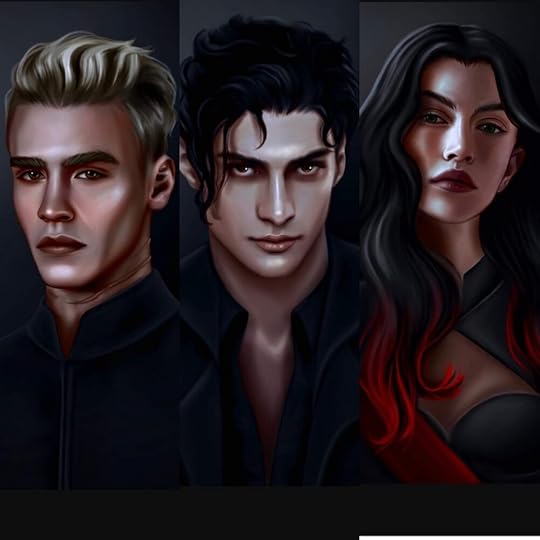
Sneek Peek of the Art Print Designs! Everyone who submits proof of pre-order will receive all nine character cards of Emory, Memphis, Adair, Marquis, Nyx, Brokk, Azarius, Alby and Lana. Submit proof of order to m.smith017@live.com.
Everyone who submits proof of pre-order will receive all nine character cards of Emory, Memphis, Adair, Marquis, Nyx, Brokk, Azarius, Alby and Lana. Submit proof of order to m.smith017@live.com.
About the Author

Mallory McCartney currently lives in Sarnia, Ontario with her husband and their three dachshunds Link, Lola and Leonard. When she isn’t working on her next novel or reading, she can be found day dreaming about fantasy worlds and hiking. Other favorite pastimes involve reorganizing perpetually overflowing bookshelves and seeking out new coffee and dessert shops.
More about Mallory McCartneySocial Media: Facebook, Twitter, Goodreads, and Instagram
Books: Heir of Lies, Queen to Ashes, and Black Dawn
author interview
book review
books
fantasy
science fiction
very short stories
Saints and Curses

December 31, 2020
Review: Sounds and Sweet Airs
While I mostly love to read sci-fi and fantasy, I do read other genres. As a classical musician and music teacher, I particularly like to read books about classical music and famous composers (I’d recommend Mozart’s Letters to anyone). I’ve had to teach a lot of music history due to Covid 19, and I wanted to include female composers as a regular part of my curriculum. In my research on female composers, I stumbled across Anna Beer’s Sounds and Sweet Airs, a book about “the forgotten women of classical music.” It focuses on eight female composers throughout history, telling about their lives, their struggles, and of course, their music. It’s a fascinating look at women who often achieved considerable recognition and respect within their own lifetimes, yet somehow their music was often ignored by (mostly male) musical historians after their deaths.

Cover of Sounds and Sweet Airs by Anna Beer
I loved reading this book—it was inspiring to me as a female musician who was always nervous about trying to write my own music. But in addition, it felt like a breath of fresh air. I felt like the stories of these women reflected a part of music history that I always suspected was there, but was somehow always obscured by the narrow focus on only a few (always male) composers (though shout out to my early music history professor, who taught us about Barbara Strozzi and Francesca Caccini). Several of the composers I had never heard of before, including Marianna Martines and Elizabeth Maconchy.
It’s hard to generalize about the composers Beer describes—they are all from different time periods and backgrounds, and their music is unique. But each one managed to overcome the strictures and expectations of their gender to compose in her own voice. Each composer’s biography was well written and engaging, though I found the story of Lili Boulanger the most haunting. As I read about each composer, I also found recordings and performances of their music on Youtube. I particularly loved Fanny Hensel’s Das Jahr, Clara Schumann’s piano trio, and Francesca Caccini’s opera, La Liberazione de Ruggiero dall’isola d’Alcina.
Overall, I’d recommend this book to anyone interested in classical music or women’s history. It’s always a pity when truly beautiful and powerful music is neglected due to silly stereotypes, and it’s a great loss if we don’t enjoy these women’s brilliant music.
author interview
book review
books
fantasy
science fiction
Saints and Curses



